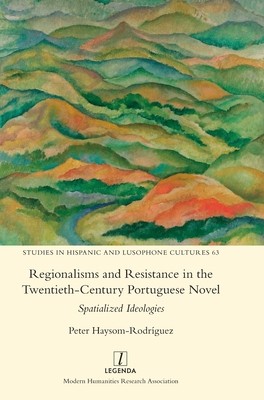
- Išsiųsime per 10–14 d.d.
- Autorius: Peter Haysom-RodrÃÂguez
- Leidėjas: Legenda
- ISBN-10: 1839543132
- ISBN-13: 9781839543135
- Formatas: 17 x 24.4 x 1.3 cm, kieti viršeliai
- Kalba: Anglų
- Extra -15 % nuolaida šiai knygai su kodu: ENG15
Regionalisms and Resistance in the Twentieth-Century Portuguese Novel (el. knyga) (skaityta knyga) | knygos.lt
Atsiliepimai
Aprašymas
Often regarded as a small and homogeneous country, modern Portugal has frequently displayed clear regional tensions, on several 'axes': between its capital, Lisbon, and more neglected cities and towns; between its developed coastline and its (noticeably declining) inland villages; between the relatively conservative small-holding communities of the North and the politically radical tenant farmers of the South, amongst others. Examining twentieth-century novelists' treatment of such geographical precepts leads one to ponder: what relationships exist between ideology and (regional) spaces? Through analysis of narrative fiction, how can one better comprehend the complex geographical grievances and identity politics that are increasingly characterising ideo-logical discourses across Western nations? The novels of Aquilino Ribeiro (1885-1963), Agustina Bessa-LuÃÂs (1922-2019), LÃÂdia Jorge (1946-) and José Saramago (1922-2010) all have their part to play, in this quest for greater understanding of Portuguese regionalisms and resistances.
Peter Haysom-RodrÃÂguez is a Lecturer in Modern Languages at the University of Leeds. He holds a Ph.D. in Portuguese & Lusophone Studies from the University of Nottingham.
EXTRA 15 % nuolaida su kodu: ENG15
Akcija baigiasi už 6d.19:56:41
Nuolaidos kodas galioja perkant nuo 10 €. Nuolaidos nesumuojamos.

- Autorius: Peter Haysom-RodrÃÂguez
- Leidėjas: Legenda
- ISBN-10: 1839543132
- ISBN-13: 9781839543135
- Formatas: 17 x 24.4 x 1.3 cm, kieti viršeliai
- Kalba: Anglų Anglų
Often regarded as a small and homogeneous country, modern Portugal has frequently displayed clear regional tensions, on several 'axes': between its capital, Lisbon, and more neglected cities and towns; between its developed coastline and its (noticeably declining) inland villages; between the relatively conservative small-holding communities of the North and the politically radical tenant farmers of the South, amongst others. Examining twentieth-century novelists' treatment of such geographical precepts leads one to ponder: what relationships exist between ideology and (regional) spaces? Through analysis of narrative fiction, how can one better comprehend the complex geographical grievances and identity politics that are increasingly characterising ideo-logical discourses across Western nations? The novels of Aquilino Ribeiro (1885-1963), Agustina Bessa-LuÃÂs (1922-2019), LÃÂdia Jorge (1946-) and José Saramago (1922-2010) all have their part to play, in this quest for greater understanding of Portuguese regionalisms and resistances.
Peter Haysom-RodrÃÂguez is a Lecturer in Modern Languages at the University of Leeds. He holds a Ph.D. in Portuguese & Lusophone Studies from the University of Nottingham.


Atsiliepimai